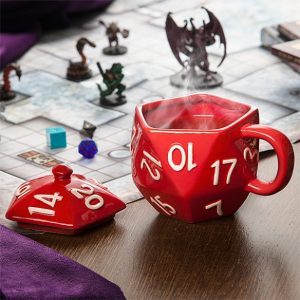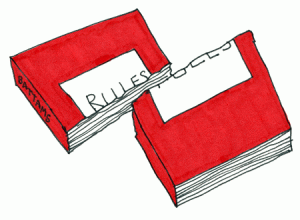Homebrew Rules

There is a lot of talk about running games “RAW” (Rules-as-Written), and while there is certainly a time and place for such things (the D&D Adventurers’ League, for example), there is also a time and place for taking a big red pen to the rulebook, and writing your own replacements.
For public clubs, where players may drop in and out, and there are people with varying experiences of games, it can be a good idea to be able to say “I’m running D&D 3.5”, or “Who’s up for some Shadowrun?” and people will know what to expect. But even then, there may be discussion over which supplements are being used, what extra publications are allowed, etc. Not all GMs are fully up to date with every expansion, and even if they are, they may not agree to use them (our club was split over the “Chrome Books” for Cyberpunk 2020. Some people loved the extra equipment, others saw it as rapidly-increasing power-creep).
Some campaigns call for limiting the beginning choices players have over what characters to play (our current game has everyone all be in the same Street gang, which is their Character Class). An early WHFRP scenario didn’t exactly outlaw Dwarves, but made it quite clear that they would not be very welcome!
From minor adjustments through to writing your own complete systems, there is a whole spectrum of house-rules/homebrew.
Why We ‘Brew

Sometimes, a rule-set is almost right, but doesn’t quite capture the flavour of the intended setting. One of our group used to use RoleMaster to run a game set in Middle Earth. Removing any Elemental spells seemed to work for the subtle magics that Tolkien seemed to favour.
Other times, a particular rule doesn’t gel with a particular group. Some people don’t like the fragility of 1st level D&D characters, and rule “Everyone gets Max HP at 1st level”, or replace the usual dice rolls for stats with one that gives a higher average (4d6, drop lowest, 2d6+6, roll 3 sets and choose, and many, many more!).
A player might pitch a character concept that the rules don’t currently cater for, and the Group can work to find a way of building some rules that can fit it into the game.
Oft times, the GM just doesn’t like some section of the rules, and replaces them with their own “better” version. One area that seems very prevalent is Order of Combat Actions (“Initiative”). Do you roll every turn? Do you roll at all, or does the PC with the highest DEX/AGY/SPD always go first? Do you go round the table, with no regard for Character abilities? Some tables prefer different ways of doing this, for “accuracy”, balance, ease of play, and other reasons. In some games, getting the 1st go is very important, others less so, so it can make a difference what style of game you want.
To try to avoid a classic situation of low level PCs specialising to a degree that they can out-do any NPC in their area, I ruled in our latest game that PCs could only start with Rank 3 in each skill (out of 5 Ranks), and only progress at 1 Rank per Level. While this has still allowed them to reach the heights, it has forced them to consider a longer term view, as they can’t suddenly buy 3 Ranks in a skill if they find it useful. I have seen games where the reverse is done, where PCs may not have more Ranks than their level, they may buy from Rank 0 to Rank 5 all at once, if they have the XP.

Unexplored areas: Not the unmapped Dungeons, or uncharted star-systems that the Players will venture forth into, but rule concepts that the Designer did not include. How long will it take our party to build a trebuchet? Can we utilise our Media Contacts to set up a propaganda campaign? Some of this is termed “Rulings” rather than “Rules”, but if it becomes a repeated action, it can become worth formalising a system for it.
A lot of games include what has been termed the “Rule Zero” section, essentially letting the reader know that the Rules are merely Guidelines, and should be altered to fit your own way of playing. This became epitomised in our early games, where the most-quoted section of the rulebook was the section saying “Do Not Quote The Rulebook”!
How to Brew
There are several factors to take into consideration when introducing House Rules. The first, and possibly most important is the very fact that you are departing from RAW. Once the precedent has been set that Rules are merely Guidelines, expect to face a tirade of players demanding that the “obviously unbalanced and unfair” sections of the rules that apply to their character should be changed to something “much more realistic and appropriate” (transl.: Moar Powah!).
This leads to the next consideration: Balance.
Usually, Games Designers have put a fair amount of work into their Systems, and tried to make sure that no single class out-shines any other (unless that is a conceit of the setting. See: Linear Fighter, Quadratic Wizard). Changing around even seemingly-innocuous rules can have unforeseen consequences on this delicate balance.
Effort/Reward: Is it worth the hassle of poring over rule changes, judging how it will affect the game, who will benefit and who will lose out, when you could just say “No”? Some players are very good at skimming over things, with a “Whatever. Lets get to the good bit!” attitude, where others find their enjoyment reduced by apparent lack of verisimilitude.

One of the long-lasting house-rules we use is the Good/Bad/Ugly Contacts for Character Creation. Everyone notes 3 people that their PC knows. One is a “Good” Contact, generally friendly and amenable. Another is “Bad”. Hostile. A rival or enemy. The third is “Ugly”. Complicated. Not reliable. This seems to work in pretty much any game we run, to help keep the players, and their PCs, attached to the World.
My Table:
My Rules!
At our Game, we have a long-term group of players, and tend to play ongoing campaigns. The latest has just hit the 52-session mark (just over a year of Weekly play, with a few gaps).

As mentioned, I put a few restriction in place at character creation (All the same Gang/Class, no Skills over Rank 3), and the stipulation that all PCs should be “rays of light in the darkness”, and at least try to get along together (D&D translation: Good alignment). Being a gutterpunk/cyberpunk game, they WILL be using underhanded tactics, and they are part of a particularly nasty Street Gang who use their Blood-based Psionics to leverage power over people’s minds, but at least try to do things for the right reasons!
As the game has progressed, I have been asked to make several Rulings on things that the Rule Book does not make clear, and usually I come down on the side of the players.
One area that was always going to be needing House Rules was the fact that one of the Antagonists is a Voodoo Sect that I have invented new Psychic Powers for. The party is made up of two Powerful Psychers, a Psychic Researcher and a Lost Soul looking for direction. Obviously, they have all jumped on this as something to learn for themselves, and so I am tasked with producing not just some effects that NPCs can call in a narrative manner, but a fully-fledged, robust skill system for the players to interact with! The Psychic Researcher is also developing new Powers in areas I did not imagine, so I also need to figure these out.
The plus side is that I only have a small group, and do not need to worry about wider concerns. So long as it works for this campaign, it does not matter if there are knock-on effects outside the Groups purview.
“What if the Immortals get hold of these powers?”, “How will this interact with the Animalists’ situation?” – Not a big part of this campaign. I’m not going to worry about it. And next campaign, I will probably rule that no-one can play a Bleeder, and so can’t have these powers!
I do need to keep some semblance of balance across the party. The powers developed by the Psychic Researcher should be better/easier-to-learn than the stuff knocked together by the Psychers, without overshadowing them. What we’re really talking about here is Spotlight Time. Do each of the Players think they are getting a fair deal, are their efforts paying off?
And this is the aim of all Home Brew, I feel. Keep the players interested. Adapt to their wants and needs, while preserving the World they are playing in. We very much play as “GM builds the World, Players play in it”, rather than some of the more player-based systems/styles out there, but player-input is still very important in what the GM builds.
Summary
There are several reasons to alter the Rules of your System, but it should be done towards one main Aim: Improving the Fun for Everyone!
Do you Home Brew/House Rule? Why? What are your favourites?
